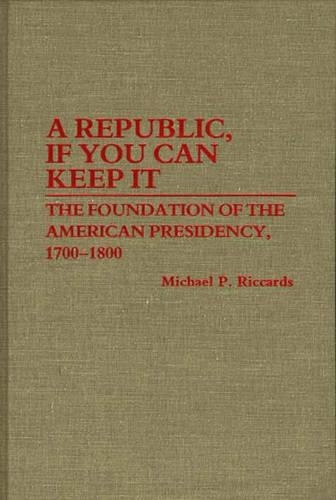
A Republic, If You Can Keep It: The Foundation of the American Presidency, 1700-1800
(Hardback)
Publishing Details
A Republic, If You Can Keep It: The Foundation of the American Presidency, 1700-1800
By (Author) Michael Riccards
Bloomsbury Publishing PLC
Praeger Publishers Inc
11th June 1987
United States
Classifications
Tertiary Education
Non Fiction
Regional, state and other local government
353.03109
Physical Properties
Hardback
242
Description
Riccards has written a unique account of the creation of and early experience with the US presidency. The author first explores the English and colonial experience that was relevant to structuring executive authority at the constitutional convention (as well as the theories supporting this experience). He then turns to familiar subjects--the decision-making in Philadelphia that led to a presidency and the role of the executive article in the ratification debate. All this is accomplished with clarity and economy of writing. The longer second part of the book is an analysis of George Washington's presidency, showing that Washington followed a federalist or strong executive model. Several brief chapters discuss the man and his popularity among the American people, the condition of the executive and bureaucracy before Washington became president, and events and policies that occupied the first president. The last chapter is an epilogue that all too briefly sets the Washington presidency in comparative and historical context. . . . The book is a useful contribution to presidential scholarship. Choice
Reviews
Michael Riccards begins his well organized and clearly written essay with chapters on "The Royal Perogative," "The Provincial Governors," and "The War Governers," introducing the kinds of executive leadership with which Americans were familiar on the eve of the Constitutional Convention of 1787. The general reader will find this introduction helpful . . . A Republic If You Can Keep It concludes with a useful guide to further reading and a valuable observation on American statecraft at the close of the eighteenth century. . . .-Presidential Studies Quarterly
Riccards has written a unique account of the creation of and early experience with the US presidency. The author first explores the English and colonial experience that was relevant to structuring executive authority at the constitutional convention (as well as the theories supporting this experience). He then turns to familiar subjects--the decision-making in Philadelphia that led to a presidency and the role of the executive article in the ratification debate. All this is accomplished with clarity and economy of writing. The longer second part of the book is an analysis of George Washington's presidency, showing that Washington followed a federalist or strong executive model. Several brief chapters discuss the man and his popularity among the American people, the condition of the executive and bureaucracy before Washington became president, and events and policies that occupied the first president. The last chapter is an epilogue that all too briefly sets the Washington presidency in comparative and historical context.... The book is a useful contribution to presidential scholarship. Brief bibliographical essay. Academic readers.-Choice
This brief work covers the origins of the American presidency as it evolved in the first dozen years of the national experience.... While this book is no doubt meant as an introduction to the institution of the presidency, it may be just as valuable for its brief but balanced and complete presentation of the major issues of the 1790s. The author does not present any significant new ideas, but he has done a good job of mastering primary and secondary resources. This book can be a valuable complement to the many new scholarly and popular books on the Constitution that are currently flooding the market.-Perspective
"Michael Riccards begins his well organized and clearly written essay with chapters on "The Royal Perogative," "The Provincial Governors," and "The War Governers," introducing the kinds of executive leadership with which Americans were familiar on the eve of the Constitutional Convention of 1787. The general reader will find this introduction helpful . . . A Republic If You Can Keep It concludes with a useful guide to further reading and a valuable observation on American statecraft at the close of the eighteenth century. . . ."-Presidential Studies Quarterly
"This brief work covers the origins of the American presidency as it evolved in the first dozen years of the national experience.... While this book is no doubt meant as an introduction to the institution of the presidency, it may be just as valuable for its brief but balanced and complete presentation of the major issues of the 1790s. The author does not present any significant new ideas, but he has done a good job of mastering primary and secondary resources. This book can be a valuable complement to the many new scholarly and popular books on the Constitution that are currently flooding the market."-Perspective
"Riccards has written a unique account of the creation of and early experience with the US presidency. The author first explores the English and colonial experience that was relevant to structuring executive authority at the constitutional convention (as well as the theories supporting this experience). He then turns to familiar subjects--the decision-making in Philadelphia that led to a presidency and the role of the executive article in the ratification debate. All this is accomplished with clarity and economy of writing. The longer second part of the book is an analysis of George Washington's presidency, showing that Washington followed a federalist or strong executive model. Several brief chapters discuss the man and his popularity among the American people, the condition of the executive and bureaucracy before Washington became president, and events and policies that occupied the first president. The last chapter is an epilogue that all too briefly sets the Washington presidency in comparative and historical context.... The book is a useful contribution to presidential scholarship. Brief bibliographical essay. Academic readers."-Choice
Author Bio
MICHAEL P. RICCARDS is President of St. John's College in Santa Fe, New Mexico.
